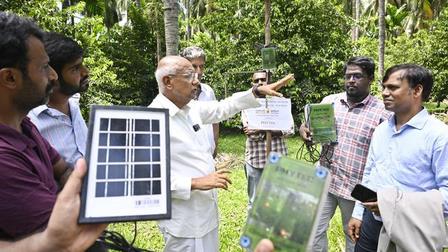Tamil Nadu: Coconut Farmers In Pollachi Deploy Climate Sensors Amid Threat Of Root Wilt Disease
The move comes as the region grapples with the widespread impact of root wilt disease, which has affected lakhs of coconut trees. While the system is not a direct solution to the disease, it is expected to provide critical real-time weather data, including temperature, humidity, rainfall, and solar radiation, to help guide decisions on alternative cropping patterns and land use.
Farmers from Anamalai, Pollachi North, and Pollachi South blocks have joined hands to install the monitoring units, which are being piloted in Kottur village. The initiative is supported by the Tamil Nadu Agricultural University (TNAU), Coimbatore.
According to M. Raveendran, Director of Research at TNAU, the disease has already affected about 10 lakh trees across the three blocks, out of an estimated 75 lakh coconut palms.
Of these, 3.5 lakh trees are severely impacted, and nearly 1 lakh have already been uprooted.
"Root wilt disease has no known cure. The only way to manage it is to remove the infected trees before it spreads further," said Raveendran.
The disease is caused by a phytoplasma, a wall-less microorganism that lives in the phloem tissue of plants and is spread by vectors such as leafhoppers and whiteflies. While it has been present for decades, its spread has intensified in recent years due to changing climatic conditions that favour vector survival.
The monitoring system consists of solar-powered, sub-gigahertz sensors installed at one-kilometre intervals. These sensors transmit data to a central gateway, which uploads it to cloud servers for analysis.
Notably, the system operates independently of mobile networks, ensuring reliable data transmission even in remote areas. TNAU has agreed to analyse the incoming data to study the influence of microclimatic changes on crop health and suitability.
Raveendran said the university was impressed by the farmers' proactive efforts and pledged full support for the initiative.
"The immediate priority is to protect existing coconut trees and safeguard the coconut-based value chain, which includes coir and other allied industries," he added.
The total coconut-growing area across the three blocks spans over 50,000 hectares, marked by distinct climatic patterns.
To bolster efforts, TNAU is currently evaluating 'Cococon', an injectable formulation now undergoing field trials, as well as testing new chemical treatments aimed at enhancing productivity.
The university is also supplying wilt-resistant coconut varieties and assessing the potential of alternative crops like fruits and spices to support long-term diversification. So far, 16 farmers in the Anamalai block have installed the devices.
Raveendran said wider adoption will depend on government support and intervention.

Legal Disclaimer:
MENAFN provides the
information “as is” without warranty of any kind. We do not accept
any responsibility or liability for the accuracy, content, images,
videos, licenses, completeness, legality, or reliability of the information
contained in this article. If you have any complaints or copyright
issues related to this article, kindly contact the provider above.
Most popular stories
Market Research

- Tradesta Becomes The First Perpetuals Exchange To Launch Equities On Avalanche
- Utila Triples Valuation In Six Months As Stablecoin Infrastructure Demand Triggers $22M Extension Round
- Blueberry Launches A Bold New Brand Platform
- Cregis Releases 2025 Cryptocurrency Wallet Analysis
- Barunson, Studio Behind Parasite, To Launch Nplug IP Remixing Platform On Story And Bring Flagship IP Onchain
- Falcon Finance Announced $FF And Community Sale On Buidlpad





















Comments
No comment